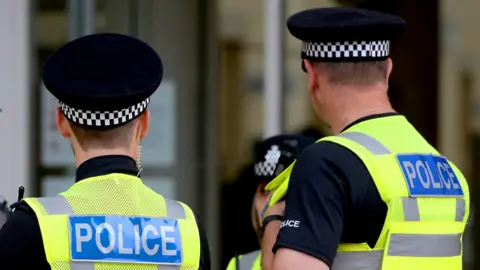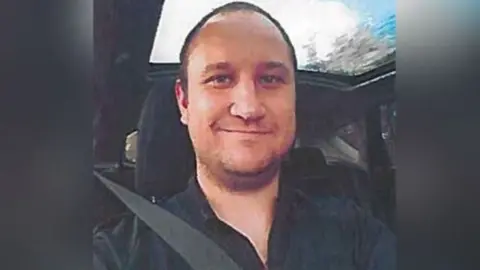Police watchdog warns 35,000 police staff 'not vetted properly'
 PA Media
PA MediaAn estimated 35,000 people working for police forces across England and Wales have not been properly vetted, a police watchdog report has found.
The number includes officers as well as non-frontline staff and contractors.
The report, by the Inspectorate of Constabulary, says forces must do more to root out sexual predators.
It highlights the case of Ian Naude, a predatory paedophile who slipped through the net and became a PC. He went on to rape a 13-year-old girl.
The inspectorate says vetting is the "first line of defence" for forces but warns that more than 10% of the police workforce do not have up-to-date vetting.
Naude, who joined Cheshire Constabulary as a student constable, was among those cited in the report, which was published alongside broader findings on pressures facing the police workforce.
He was jailed for 25 years in December last year after he preyed on a teenager who he met when he was called to a domestic incident.
 Cheshire Police
Cheshire PoliceAt his trial, Naude was described as having joined the police to "gain the keys to a sweet shop".
According to the report, better vetting would have revealed that complaints involving other children had been made against him to other forces.
It also highlighted the case of West Midlands officer Palvinder Singh, who bombarded vulnerable victims with hundreds of messages.
The inspectors - Her Majesty's Inspectorate of Constabulary and Fire and Rescue Services - scrutinised 43 forces across England and Wales to look at those who abused their positions for sexual purposes. Five forces did not provide any vetting information but some details have since been given.
 West Midlands Police
West Midlands PoliceInspector of constabulary Zoe Billingham said the estimated 35,000 people who did not have the required levels of vetting could include officers and staff, as well as contractors and volunteers.
She said it was the "best estimate" since forces were inconsistent in how they recorded this information - but added the number could be higher.
"Most of the victims are women and most of the perpetrators are men," she said.
"Too often their abuser plays the role of the saviour in policing. They play the role of the knight in shining armour."
The report adds:
- On average 13% of people in each force have not been vetted
- Inspectors believe 37% of the Metropolitan Police do not have the correct vetting
- Around half of those working for West Midlands Police, the second biggest force in the country, do not have proper vetting (52%), followed by 42% in Thames Valley Police
Inspectors also say two thirds of forces have outdated technology which means they cannot detect misuse of IT systems.
The report also says police watchdog the Independent Office for Police Conduct received 415 complaints under the category about abuse of position for sexual purposes in the three years to the end of March, .
But it is not clear in how many allegations of misconduct were found to be proven.
'A workforce under pressure'
A report published at the same time finds pressures on the police workforce have led to delays in attending calls, investigations taking too long, and officers and staff lacking adequate training and supervision.
Although it says "most forces are performing well", it notes that "a workforce under pressure cannot give the public its best level of service".
The Inspectorate of Constabulary has also published a series of reports on individual forces. They include an inspection report on the scandal-hit Cleveland Police, which it found has been "putting the public at risk" because of a catalogue of failings.
'Deeply disappointed'
Commenting on the findings about vetting, Ms Billingham said she was "deeply disappointed" to find some forces had still not put even "basic" measures" in place, despite inspectors calling for improvements for years.
And she said there was "no agreed way of passing soft intelligence between forces" when police officers move to a new force, so predators who "get wind" of a complaint "run before they are caught".
Inspector of constabulary Matt Parr added: "It is entirely possible for someone to be vetted and slip through the net. That's not an excuse for not doing it [vetting] in the first place."
The Metropolitan Police said it noted the concerns and recommendations, adding: "The MPS is currently recruiting in large numbers and has made the decision to prioritise the vetting of new police officers in order to grow our officer numbers as quickly as possible. This means that some other cases will take longer, including the re-vetting of existing staff. However, we have taken steps to increase the size of the vetting team to cope with the increased demand.
"This will take some time to become fully effective but good progress is being made."
